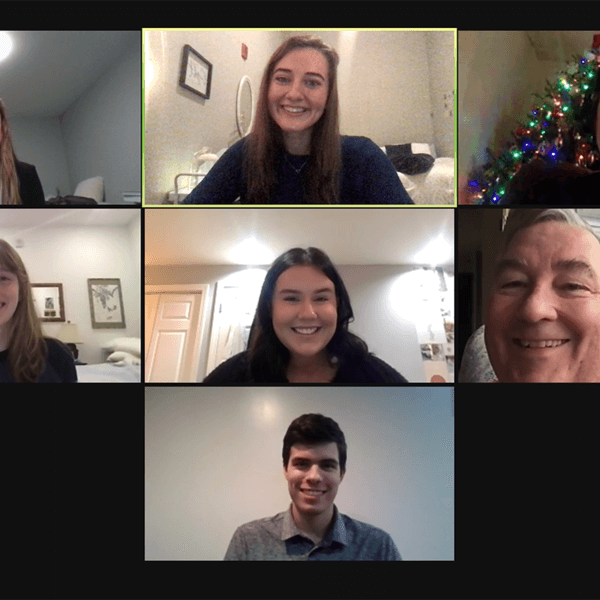The Holy Cross mediation team took first prize at the major collegiate tournament of the fall 2020 semester, the Brenau Invitational Mediation Tournament—the latest in a years-long string of successful showings on the national and international mediation competition circuit.
At mediation tournaments, students from undergraduate institutions face off in simulated mediation situations, where competitors must reach a mutually satisfying deal in response to a hypothetical legal problem. The tournaments are run by the International Academy of Dispute Resolution (INADR), and the Holy Cross team has competed across the United States and internationally.
In 2020, they competed virtually during the Covid-19 pandemic, and that international health crisis was also front and center in one of the cases the students were tasked with negotiating. The tournaments take place in multiple rounds, where students rotate in assuming the role of mediators, advocates, and clients, and they can earn points for their team with their performance. In the pandemic example, tenants were facing eviction for not paying their rent, after losing their jobs as a direct result of the pandemic.
The Holy Cross team, advocating on the side of the landlord, came up with a two-part solution that benefitted both parties, according to mediation team member Bridget Whelpley '21, a biology major and rhetoric and composition minor.
"One aspect was establishing a rent payment formula based on how much government assistance a tenant was receiving. And the second half of our solution established periodic landlord-tenant roundtables, so that there could be an open line of communication between the parties—and future misunderstandings could be avoided," said Whelpley, who also won first place in the individual mediator category and earned the Elizabeth Baumgardner Award, given to the student with the highest combined score in the mediator and advocate roles at this tournament.
By participating in these tournaments, Whelpley and her teammates learn to listen critically, consider all sides of an argument, and then clearly articulate creative, fair solutions to problems. It's an ideal activity for students considering law school, but equips students with collaboration and communication skills for any field.
"Participation in the team is strong because students prize the skills that they develop for their futures in law school and as attorneys. They learn how to research legal cases and ideas, and learn how to argue their points," said Anthony Cashman, the director of the Office of Distinguished Fellowships and Graduate Studies. "In fact, even for team members who do not wish to become lawyers, the students learn public speaking and self-presentation. These elements fit perfectly with the critical-thinking skills that are the target of Holy Cross' liberal arts curriculum."
Ed McDermott '79 P10 P13, who has coached Holy Cross mock trial since the late 1990s and formed the mediation team in 2015, says students enjoy how mediation "lets them work towards a mutual resolution of a problem, as opposed to going to combat and vanquishing your opponent." And, he says, Holy Cross students bring a common strength into the tournaments.
"They are able to pivot extremely well, and what I mean by pivot is, they can think on their feet quickly and creatively. Nothing phases them, based on my years of coaching," McDermott said. "When the other team comes up with something that’s a little novel or creative, our students just have that innate ability to adjust on their feet, and that’s going to serve them well in whatever profession they go into."
Brian Senier '19 went the law school route, and says his mediation experience is an asset during exams.
"Mediation broadened my legal vocabulary and activated my creativity. Success in law school requires at once understanding the black-letter law and theory, and an ability to apply the law to the facts, clearly and persuasively," said Senier, a second-year student at Suffolk Law School in Boston.
His teammate Jessica Russo '19 is also in law school, at the Catholic University of America in Washington, DC, but says the team is for "anyone who wants to sharpen their communication and problem-solving skills, regardless of whether or not you are planning to go to law school."
For Coach McDermott, it's about both preparing students for the next phase of their life—and having a little fun along the way.
"You have to have fun during these endeavors. As much as augmenting their skill set is good for the students, they aren’t going to do it unless they enjoy it," McDermott says. "And they really do enjoy mediation."
Holy Cross Mediation Team Takes Home Top Prize Once Again in International Competition

The team attributes their history of success on the competition circuit to their liberal arts education
Read Time
3 Minutes

